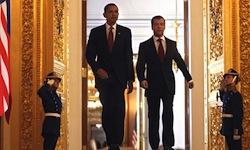A New START for the US and Russia
March 25, 2010
Featured Image
We are happy to serve you a daily summary of the day's top nuclear policy stories each morning, with excerpts from the stories in bullet form.
Stories we're following today:
Russia and U.S. Report Breakthrough on Arms - The New York Times [link]
- The United States and Russia have broken a logjam in arms control negotiations and expect to sign a treaty next month to slash their nuclear arsenals to the lowest levels in half a century.
- The treaty will impose a new inspection regime to replace one that lapsed in December, but will not restrict American plans for missile defense based in Europe.
- President Obama and President Dmitri A. Medvedev of Russia plan to talk Friday to complete the agreement.
- The two sides have begun preparing for a signing ceremony in Prague on April 8, timing it to mark the anniversary of Mr. Obama’s speech in the Czech capital outlining his vision for eventually ridding the world of nuclear weapons.
- The White House hopes the treaty will build on the president’s victory in the fight to overhaul health care, demonstrating progress on both the international and domestic fronts after months of frustration over unmet goals.
U.S. and Russia Agree on Missile-Defense Workaround for New Nuke Treaty - Josh Rogin in The Cable [link]
- American and Russian negotiators have come to terms on how to handle the thorniest point of contention inside the negotiations over a new nuclear arms-reduction treaty: missile defense.
- "Missile defense will not be part of the treaty, but in the preamble both parties will state their positions and there will be a mention of offense and defense and the importance of those," ranking Republican on the Senate Foreign Relations Committee Richard Lugar said.
- He added that because the missile-defense statements were outside the main text, "they are in essence editorial opinions."
- Lugar said he intends to support the agreement and hearings could begin in May.
China Joins Talks on Iran Sanctions, Still No Deal - Reuters [link]
- Beijing, which had refused for months to engage in serious discussions on sanctions, joined the call among senior foreign ministry officials from the five permanent U.N. Security Council members and Germany.
- As expected, the six nations did not agree on a draft sanctions resolution on Wednesday, though envoys said the main topic of conversation was a U.S.-drafted sanctions proposal.
- British Ambassador to the UN Mark Lyall Grant said China's former deputy U.N. ambassador, Liu Zhenmin, was on the call and was the new lead Chinese negotiator on the Iran issue.
- Western envoys said Liu was a sensible choice, since he helped negotiate some of the earlier Iran sanctions resolutions.
Nuclear Posture Review Weeks Away, Gates Says - Global Security Newswire [link]
- The Pentagon-led Nuclear Posture Review "will be out probably within about two to three weeks," Gates told the House Appropriations Defense Subcommittee this morning.
- Representative Peter Visclosky (D-Ind.), who serves as chairman of the Appropriations Energy and Water Development Subcommittee, noted that the president's proposed fiscal 2011 spending plan has "money built into the budget anticipating additional infrastructure investment" at the National Nuclear Security Administration.
- Visclosky said he and energy subcommittee ranking member Rodney Frelinghuysen (R-N.J.) "don't want to make that investment until we see what [the nuclear] strategy is."



